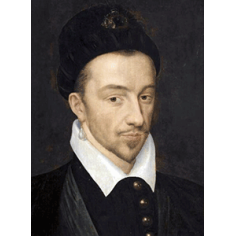About author : JANEQUIN Clément

Clément Janequin (c. 1485 – 1558) was a French composer of the Renaissance. He was one of the most famous composers of popular chansons of the entire Renaissance, and along with Claudin de Sermisy, was hugely influential in the development of the Parisian chanson, especially the programmatic type.
The wide spread of his fame was made possible by the concurrent development of music printing.Janequin was born in Châtellerault, Vienne. His career was highly unusual for his time, in that he never had a regular position with a cathedral or an aristocratic court. Instead he held a series of minor positions, often with important patronage. He was born in Châtellerault, near Poitiers, though no documents survive which establish any details of his early life or training.
In 1505 he was employed as a clerk in Bordeaux, to Lancelot du Fau, who eventually became Bishop of Luçon; he retained this position until du Fau's death in 1523, at which time he took a position with the Bishop of Bordeaux. Around this time he became a priest, though his appointments were rarely lucrative; indeed he always complained about money.
After 1530 Janequin held a succession of posts in Anjou, beginning as a singing teacher to the choirboys at the cathedral at Auch, and progressing to maître de chapelle at the singing school at Angers Cathedral. Around this time he attracted the attention of Jean de Guise, the patron of Erasmus, Clement Marot, and Rabelais; it was a welcome career boost, and, in 1548, with the additional assistance of Charles de Ronsard (the brother of poet Pierre de Ronsard), he became curate at Unverre, not far from Chartres. During this time he lived in Paris.
By 1555 he was listed as a "singer ordinary" of the king's chapel, and shortly thereafter became "composer ordinary" to the king: only one composer (Sandrin, also known as Pierre Regnault) had previously had this title. In his will, dated January 1558, he left a small estate to charity, and he complained again of age and poverty in a dedication to a work published posthumously in 1559. He died in Paris.




